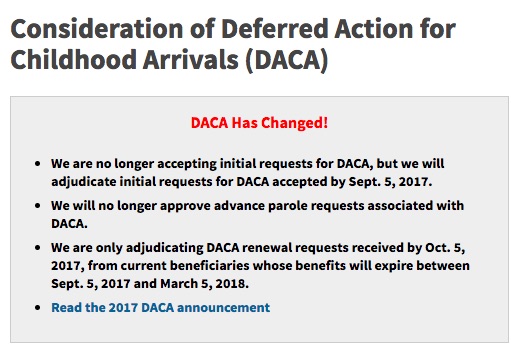
From the U.S. Citizenship and Immigration Services (USCIS) specifying recent changes to the Obama-era DACA Policy
In the wake of President Trump’s decision to move towards ending the Deferred Action for Childhood Arrivals program (DACA), Southern Oregon University President Linda Schott promised to protect current DACA students at SOU in any lawful way possible.
“We will resist immigration enforcement at SOU without legal compulsion or evidence of imminent risk to public safety,” Schott said in her email to faculty and students Sept. 5. “The worst thing would be students that have spent their time here with us and getting their degree be deported,” later said in an interview with The Siskiyou.
“It’s hard in this case because these are young people who came here and made lives here with their families,” said Schott. Under the guidelines to become a DACA student children have to have come to the United States before reaching their sixteenth birthday and under the age of thirty one before June 15, 2012, according to United States Citizenship and Immigration Services.
President Donald Trump announced the end of the DACA program Sept. 5 after 10 Republican Attorney Generals threatened to sue the President for not taking sooner action on ending DACA upon taking office, according to Newsweek. Congress has until March 5th to plan an immigration bill that would replace DACA.
Currently, two Republican Senators are working on a new immigration plan that would replace DACA titled the “SUCCEED Act.” In order to be eligible for this proposed program applicants would need to pass a background check, have a high school diploma or GED equivalent, and would need to have been in the United States since June 12, 2012. According to a report from ABC News current recipients of DACA would have “…’conditional permanent residence’ for 10 years before becoming eligible to apply for a green card, and that status could be renewed after five years.”
Legislation to protect children from deportation initially began in 2001 under the DREAM Act. However, the program was unsuccessful as it was unable to go through Congress for many years, according to Vox. In 2012 through executive action under former President Obama’s administration The Deferred Action for Childhood Arrivals began, in order to protect children from deportation. There are around 800,000 DACA recipients in the United States at this time.
When it comes to protecting the safety and privacy of DACA students at SOU, Campus Public Safety and Parking has a plan in place to assist those in need should their identity as a DACA student become revealed. “We’re a 100% in the same ballpark as she [President Schott] is with the response. It’s all about education and providing protection and security of individual rights and that’s what we’re here for,” said the Director of Campus Public Safety and Parking (CPS), Frederick Creek. “It’s whatever support we can give at the time that it’s needed,” he continued.
“We do escorts, we go to classrooms, we go to all these type of things. We’re well prepared to help individuals if they’re having challenges or situations and we’ll stand in front of them if these type of things happen and they’re threatened,” said Creek. “I’ve been in this for 20 some years and never has anybody asked for an immigration status on a student. It just doesn’t happen,” said Creek.
As of April 2014 Jackson county has been a sanctuary county meaning Jackson county protects illegal aliens by enforcing laws, rules, or regulations that, according to the Center for Immigration Studies, obstruct immigration enforcement and shield criminals from ICE. There are currently 32 sanctuary cities in the state of Oregon.
Creek explained how the rules of a sanctuary county apply to a university setting: “Let’s say we make an arrest on campus for a minor in possession, which our staff are allowed to do, and for some reason it comes up about his status as a US citizen.”
“We don’t address that, we don’t bring that up, we don’t ask that question we don’t concern ourselves with the status of this person as a citizen or not citizen of the United States all we deal with is within our purview which is the minor in possession or any other rule violation that they may have,” Creek continued.
“I wonder in terms of these kids mental health, what is that doing to them,” asked Kathy Keesee, Program Director at Unete, a Medford based advocacy group dedicated to assisting both farm workers and immigrants. “It’s a lot of uncertainty,” said Keesee who is unconfident in the government’s ability to pass an immigration law that does not result in a border wall, does not include expedited removal for immigrants, and allows an access for citizenship.



